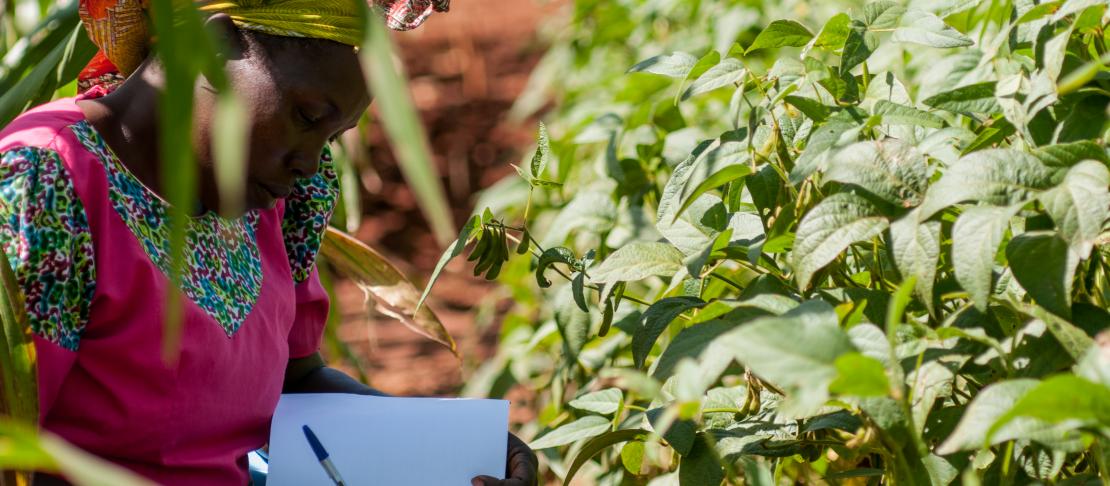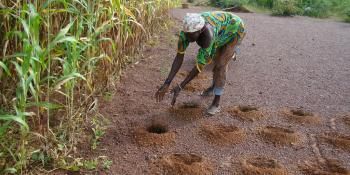Setting an innovative vision for transforming agriculture and food security under climate variability and change in East Africa

Developing an integrated research for development strategy for CCAFS East Africa.
We cannot conduct business as usual and expect to transform Africa’s agriculture, especially in this era of increasing climate variability and change." Dawit Solomon, Regional Program Leader, CGIAR Research Program on Climate Change, Agriculture and Food Security (CCAFS) East Africa.
Dawit Solomon made this remark during the CCAFS East Africa Strategy Meeting held in Arusha, Tanzania between 8 and 9 February 2018. The meeting brought together 65 stakeholders comprising of researchers, regional policymakers, experts from governments, private sector, multilateral international organizations and NGOs from East Africa and around the world to develop an integrated research for development strategy for CCAFS East Africa. Through a range of participatory and interactive approaches, the stakeholders examined the interactions, synergies and trade-offs between climate change, agriculture, and food nutrition and security, highlighting new opportunities to advance climate-resilient and low emissions agriculture, reduce vulnerability, and enhance nutrition and diversify smallholder incomes in East Africa, integrating gender and social inclusion.
National, regional and continental priorities
In order to ensure demand-driven research for development aligned with national, regional and global priorities, the meeting started off with a panel discussion comprising of policymakers from the four CCAFS focus countries in East Africa— Ethiopia, Kenya, Uganda and Tanzania—and representatives from the African Group of Negotiators to give a regional and continental perspective. The panel discussion focused on climate change-related challenges and opportunities for each country and identified entry points for CGIAR and specifically for CCAFS including opportunities for collaboration. George Wamukoya of VUNA and a member of the African Group of Negotiators (AGN) moderated the discussion and the panelists included:
- Debasu Bayleygn Eyasu – Ministry of Environment, Forest and Climate Change, Ethiopia
- Robin Mbae – Ministry of Agriculture, Livestock and Fisheries, Kenya
- Stephen Muwaya – Ministry of Agriculture, Animal Industry and Fisheries, Uganda
- Mponda Malozo – Ministry of Agriculture, Food Security and Cooperatives, Tanzania
- Raymond Kasei – Representing the African Group of Negotiators
Key challenges emerging across the region include low agricultural productivity, increase in pest and disease incidences, post-harvest losses and low uptake of technologies. Proposed priority areas for CCAFS and CGIAR support included:
- Developing monitoring and evaluation indicators for measuring agricultural resilience;
- Data to inform the implementation of nationally determined contributions (NDCs);
- Implementation of the CSA strategies and frameworks developed in different countries including providing evidence on successful CSA practices and technologies for up scaling;
- Input into national Medium Term Plans;
- Climate finance and insurance;
- Information services and capacity building for researchers and policymakers in East Africa.
What role can science play?
With increasing climate variability and change, the scientific community has an essential role to play in informing synchronized, strategic investments to establish climate-resilient agricultural production systems, minimize greenhouse gas emissions, make efficient use of resources and ensure food nutrition and security. During the meeting, scientists from different CGIAR centers shared ongoing work on climate change adaptation and mitigation in East. These included:
- Peter Craufurd of CIMMYT shared how the Taking Maize Agronomy to Scale in Africa (TAMASA) initiative is applying technology to increase knowledge delivery through smartphone.
- Polly Ericksen spoke on the work ILRI is doing under the program on climate-smart livestock which seeks to provide scientific evidence to livestock stakeholders. This is especially critical to inform countries as they implement their Nationally Determined Contributions.
- Evan Girvetz of CIAT highlighted various initiatives on CSA, including the application of CCAFS science to de-risk agriculture to improve access to credit for smallholder farmers, business models for scaling CSA and technical support to guide large investments in CSA.
- Todd Rosenstock shared some of the on-going climate change related project at ICRAF which focus on climate-smart value chains including access to credit, climate-smart agroforestry and multi-scale co-learning processes to scale up climate-smart options.
- Laurence Jassogne shared how IITA is supporting the development and implementation of policies on climate change adaptation and mitigation, including an example from the coffee sector.
- Rosa Maria Roman-Cuesta of CIFOR demonstrated how a landscape approach can be used to manage trade-offs between social and ecological impacts including landscape restoration through integrated landscape management practices.
- Carlo Fadda of Bioversity spoke about community seed banking initiatives in Ethiopia, Tanzania and Uganda including seed trade within the region.
Emerging innovative research areas
To further support the scientific input, six presentations were shared by thematic speakers on emerging areas for research and development. The themes included climate services, climate finance, linking mitigation science and policy, the role of decision support tools and the role of the youth. Specific topics covered included:
- Improving availability, access, and use of climate information and ICT-based agro-advisory in East Africa, Jim Hansen – IRI, Columbia University, USA.
- Bringing East African countries together to find ways to grow more food without increasing greenhouse gas emissions, Hayden Montgomery – the Global Research Alliance on Agricultural Greenhouse Gases.
- Making climate finance work for agriculture in East Africa, Alberto Millan – World Bank’s Global Food and Agriculture Practice (GFADR).
- Implementing innovative/transformative adaptation and mitigation science and policy measures for East Africa agriculture, Andreas Wilkes – UNIQUE forestry and land use, Germany.
- Applying interactive decision support tools to understand how climate change and natural disasters impact agriculture, food security and livelihoods in East Africa, Travis Franck – Climate Interactive.
- Transformation of East African Agriculture with ICT-based digital solutions and the youth, Romano Kiome – ILRI.
See the presentations:
New CSA projects launched in East Africa
In terms of investments, moving forward, Bruce Campbell, director of CCAFS pointed out that 4 million dollars will be invested annually in the 4 CCAFS focus countries. "Yearly, about 20 million dollars is raised by the programme for climate-smart agriculture projects for all the five regions in the world, including Africa," he added during the media interview held at the strategy meeting.
The CCAFS strategy meeting was held back to back with the kick-off meeting of the Food & Business GCP4 projects which took place on 6 – 7 February. The eight research projects funded in the fourth Global Challenges Programme call will be implemented in East Africa beginning 2018, and focus on how to scale climate-smart agriculture practices in East Africa. The new projects will contribute to the achievement of the regional strategy for development.
See the photos from the meetings:
Read more:
- Blog: 8 new projects join forces to scale climate-smart agriculture
- Blog: What's the state of climate adaptation and mitigation efforts in African agriculture?
- Blog: Unpacking climate-smart agriculture for upscaling in East Africa
- Blog: Is digital agriculture the key to revolutionize future farming in Africa?
- GCP/NWO summary: Kick-off meeting of the Food & Business GCP4 projects
Catherine Mungai is the Partnerships and policy specialist at CCAFS East Africa.
Maren Radeny is the Science officer at CCAFS East Africa.



